Exploring Relational Practice in Nursing: Addressing Patient Needs
VerifiedAdded on 2023/06/03
|9
|2608
|201
Essay
AI Summary
This essay delves into the concept of relational practice in nursing, utilizing a case study of a patient and her husband experiencing sleep deprivation in a hospital setting. The student nurse reflects on their interactions through a relational lens, emphasizing the importance of considering the patient's emotional, psychological, and physiological well-being. The essay highlights the student nurse's attempts to understand the patient's needs, including addressing external hospital noises and assuring her about her children's well-being. It also critically analyzes the student nurse's relational practice, therapeutic communication skills, and adherence to ethical guidelines. The essay concludes that while the student nurse demonstrated empathy and compassion, there were shortcomings in assertiveness and patient involvement in care planning, suggesting areas for future improvement in relational practice to enhance patient outcomes. Desklib provides access to similar solved assignments and past papers for students.
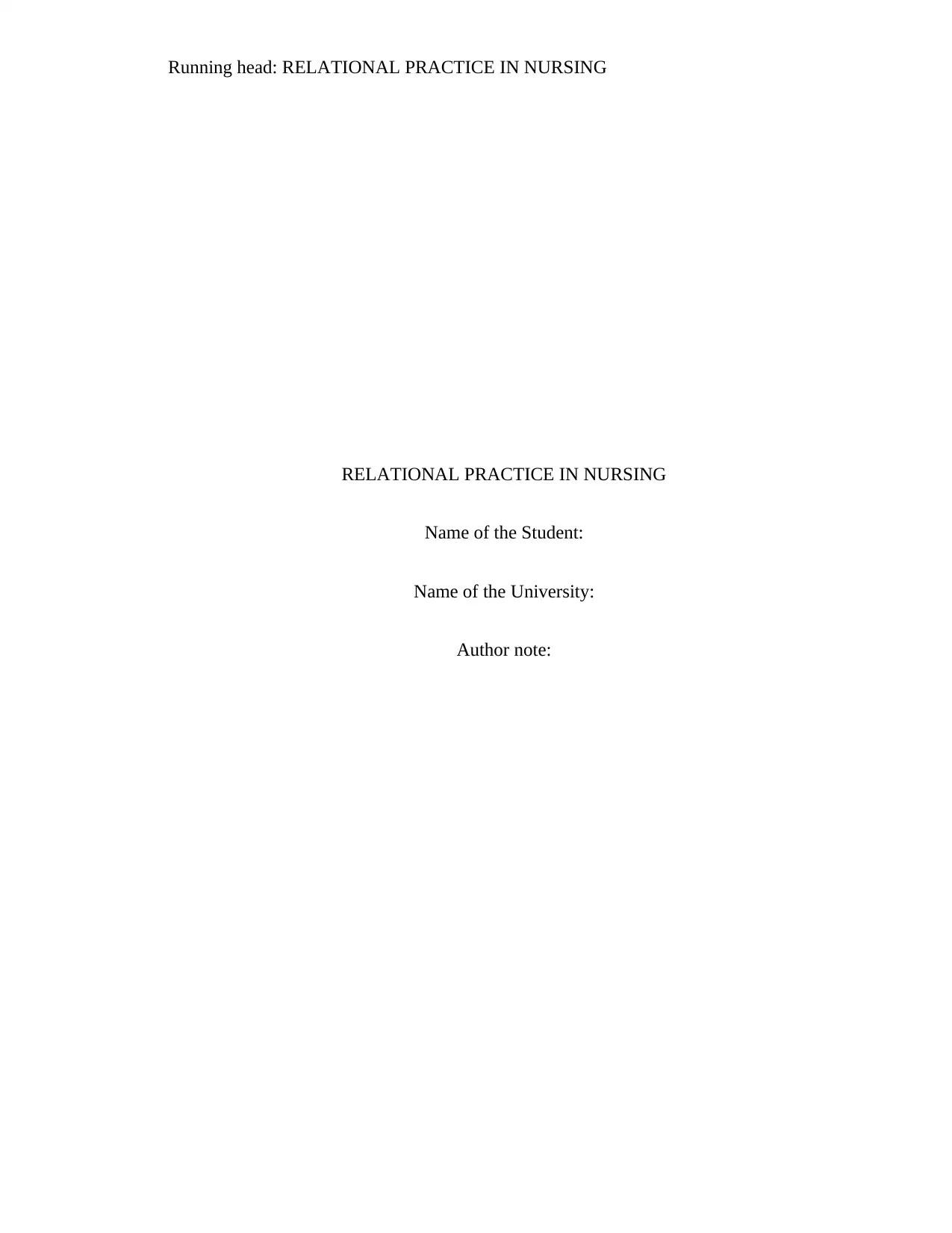
Running head: RELATIONAL PRACTICE IN NURSING
RELATIONAL PRACTICE IN NURSING
Name of the Student:
Name of the University:
Author note:
RELATIONAL PRACTICE IN NURSING
Name of the Student:
Name of the University:
Author note:
Paraphrase This Document
Need a fresh take? Get an instant paraphrase of this document with our AI Paraphraser
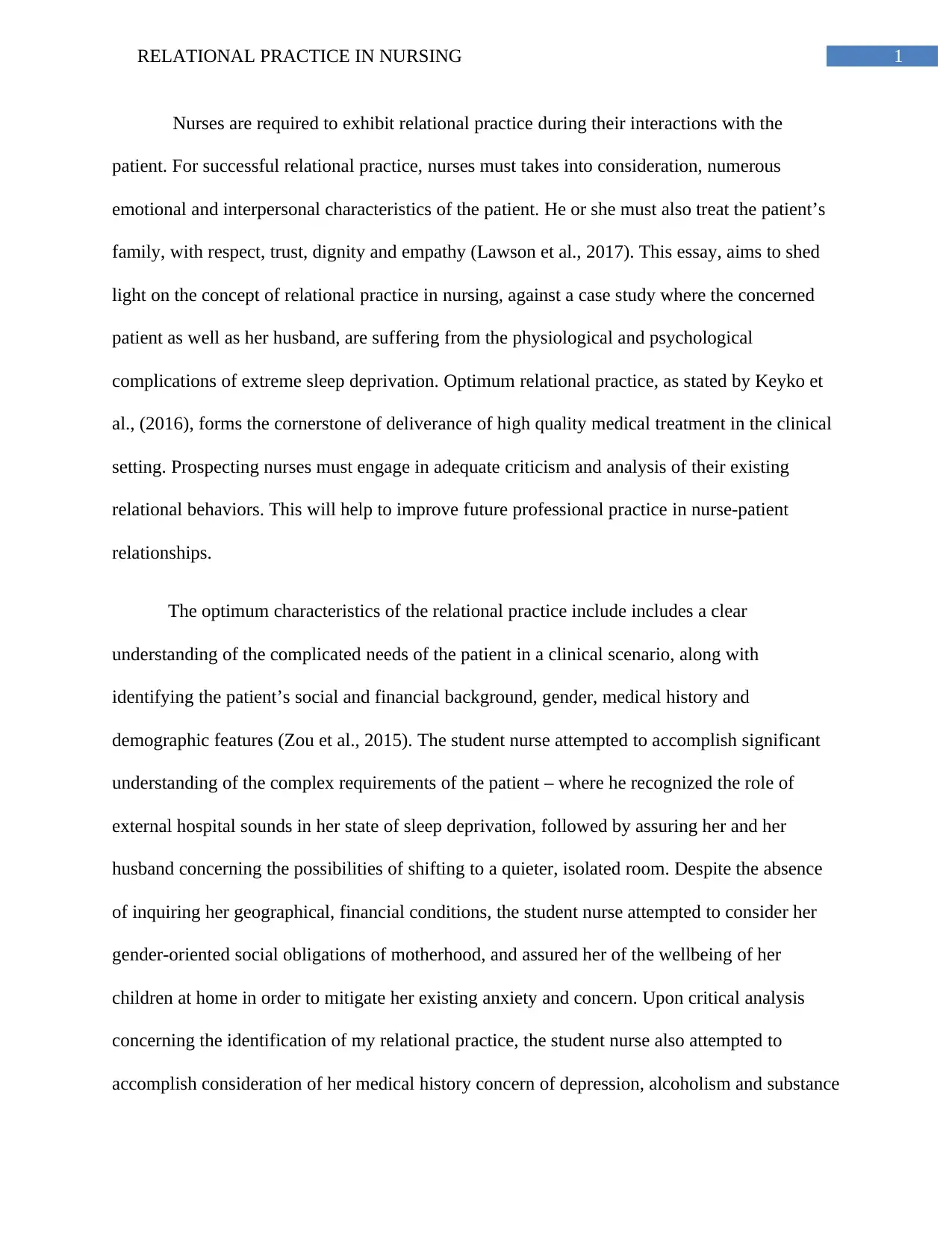
1RELATIONAL PRACTICE IN NURSING
Nurses are required to exhibit relational practice during their interactions with the
patient. For successful relational practice, nurses must takes into consideration, numerous
emotional and interpersonal characteristics of the patient. He or she must also treat the patient’s
family, with respect, trust, dignity and empathy (Lawson et al., 2017). This essay, aims to shed
light on the concept of relational practice in nursing, against a case study where the concerned
patient as well as her husband, are suffering from the physiological and psychological
complications of extreme sleep deprivation. Optimum relational practice, as stated by Keyko et
al., (2016), forms the cornerstone of deliverance of high quality medical treatment in the clinical
setting. Prospecting nurses must engage in adequate criticism and analysis of their existing
relational behaviors. This will help to improve future professional practice in nurse-patient
relationships.
The optimum characteristics of the relational practice include includes a clear
understanding of the complicated needs of the patient in a clinical scenario, along with
identifying the patient’s social and financial background, gender, medical history and
demographic features (Zou et al., 2015). The student nurse attempted to accomplish significant
understanding of the complex requirements of the patient – where he recognized the role of
external hospital sounds in her state of sleep deprivation, followed by assuring her and her
husband concerning the possibilities of shifting to a quieter, isolated room. Despite the absence
of inquiring her geographical, financial conditions, the student nurse attempted to consider her
gender-oriented social obligations of motherhood, and assured her of the wellbeing of her
children at home in order to mitigate her existing anxiety and concern. Upon critical analysis
concerning the identification of my relational practice, the student nurse also attempted to
accomplish consideration of her medical history concern of depression, alcoholism and substance
Nurses are required to exhibit relational practice during their interactions with the
patient. For successful relational practice, nurses must takes into consideration, numerous
emotional and interpersonal characteristics of the patient. He or she must also treat the patient’s
family, with respect, trust, dignity and empathy (Lawson et al., 2017). This essay, aims to shed
light on the concept of relational practice in nursing, against a case study where the concerned
patient as well as her husband, are suffering from the physiological and psychological
complications of extreme sleep deprivation. Optimum relational practice, as stated by Keyko et
al., (2016), forms the cornerstone of deliverance of high quality medical treatment in the clinical
setting. Prospecting nurses must engage in adequate criticism and analysis of their existing
relational behaviors. This will help to improve future professional practice in nurse-patient
relationships.
The optimum characteristics of the relational practice include includes a clear
understanding of the complicated needs of the patient in a clinical scenario, along with
identifying the patient’s social and financial background, gender, medical history and
demographic features (Zou et al., 2015). The student nurse attempted to accomplish significant
understanding of the complex requirements of the patient – where he recognized the role of
external hospital sounds in her state of sleep deprivation, followed by assuring her and her
husband concerning the possibilities of shifting to a quieter, isolated room. Despite the absence
of inquiring her geographical, financial conditions, the student nurse attempted to consider her
gender-oriented social obligations of motherhood, and assured her of the wellbeing of her
children at home in order to mitigate her existing anxiety and concern. Upon critical analysis
concerning the identification of my relational practice, the student nurse also attempted to
accomplish consideration of her medical history concern of depression, alcoholism and substance
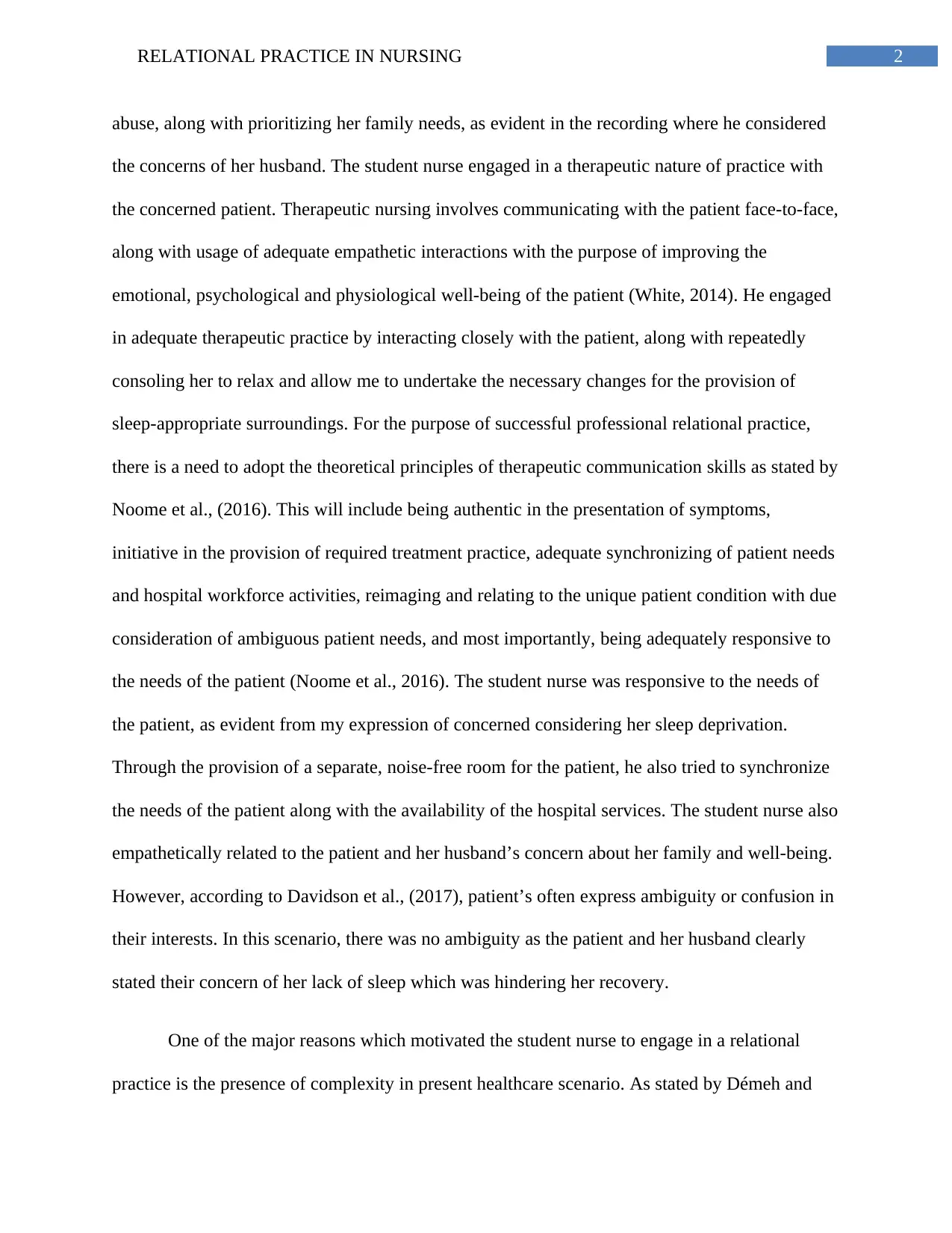
2RELATIONAL PRACTICE IN NURSING
abuse, along with prioritizing her family needs, as evident in the recording where he considered
the concerns of her husband. The student nurse engaged in a therapeutic nature of practice with
the concerned patient. Therapeutic nursing involves communicating with the patient face-to-face,
along with usage of adequate empathetic interactions with the purpose of improving the
emotional, psychological and physiological well-being of the patient (White, 2014). He engaged
in adequate therapeutic practice by interacting closely with the patient, along with repeatedly
consoling her to relax and allow me to undertake the necessary changes for the provision of
sleep-appropriate surroundings. For the purpose of successful professional relational practice,
there is a need to adopt the theoretical principles of therapeutic communication skills as stated by
Noome et al., (2016). This will include being authentic in the presentation of symptoms,
initiative in the provision of required treatment practice, adequate synchronizing of patient needs
and hospital workforce activities, reimaging and relating to the unique patient condition with due
consideration of ambiguous patient needs, and most importantly, being adequately responsive to
the needs of the patient (Noome et al., 2016). The student nurse was responsive to the needs of
the patient, as evident from my expression of concerned considering her sleep deprivation.
Through the provision of a separate, noise-free room for the patient, he also tried to synchronize
the needs of the patient along with the availability of the hospital services. The student nurse also
empathetically related to the patient and her husband’s concern about her family and well-being.
However, according to Davidson et al., (2017), patient’s often express ambiguity or confusion in
their interests. In this scenario, there was no ambiguity as the patient and her husband clearly
stated their concern of her lack of sleep which was hindering her recovery.
One of the major reasons which motivated the student nurse to engage in a relational
practice is the presence of complexity in present healthcare scenario. As stated by Démeh and
abuse, along with prioritizing her family needs, as evident in the recording where he considered
the concerns of her husband. The student nurse engaged in a therapeutic nature of practice with
the concerned patient. Therapeutic nursing involves communicating with the patient face-to-face,
along with usage of adequate empathetic interactions with the purpose of improving the
emotional, psychological and physiological well-being of the patient (White, 2014). He engaged
in adequate therapeutic practice by interacting closely with the patient, along with repeatedly
consoling her to relax and allow me to undertake the necessary changes for the provision of
sleep-appropriate surroundings. For the purpose of successful professional relational practice,
there is a need to adopt the theoretical principles of therapeutic communication skills as stated by
Noome et al., (2016). This will include being authentic in the presentation of symptoms,
initiative in the provision of required treatment practice, adequate synchronizing of patient needs
and hospital workforce activities, reimaging and relating to the unique patient condition with due
consideration of ambiguous patient needs, and most importantly, being adequately responsive to
the needs of the patient (Noome et al., 2016). The student nurse was responsive to the needs of
the patient, as evident from my expression of concerned considering her sleep deprivation.
Through the provision of a separate, noise-free room for the patient, he also tried to synchronize
the needs of the patient along with the availability of the hospital services. The student nurse also
empathetically related to the patient and her husband’s concern about her family and well-being.
However, according to Davidson et al., (2017), patient’s often express ambiguity or confusion in
their interests. In this scenario, there was no ambiguity as the patient and her husband clearly
stated their concern of her lack of sleep which was hindering her recovery.
One of the major reasons which motivated the student nurse to engage in a relational
practice is the presence of complexity in present healthcare scenario. As stated by Démeh and
⊘ This is a preview!⊘
Do you want full access?
Subscribe today to unlock all pages.

Trusted by 1+ million students worldwide
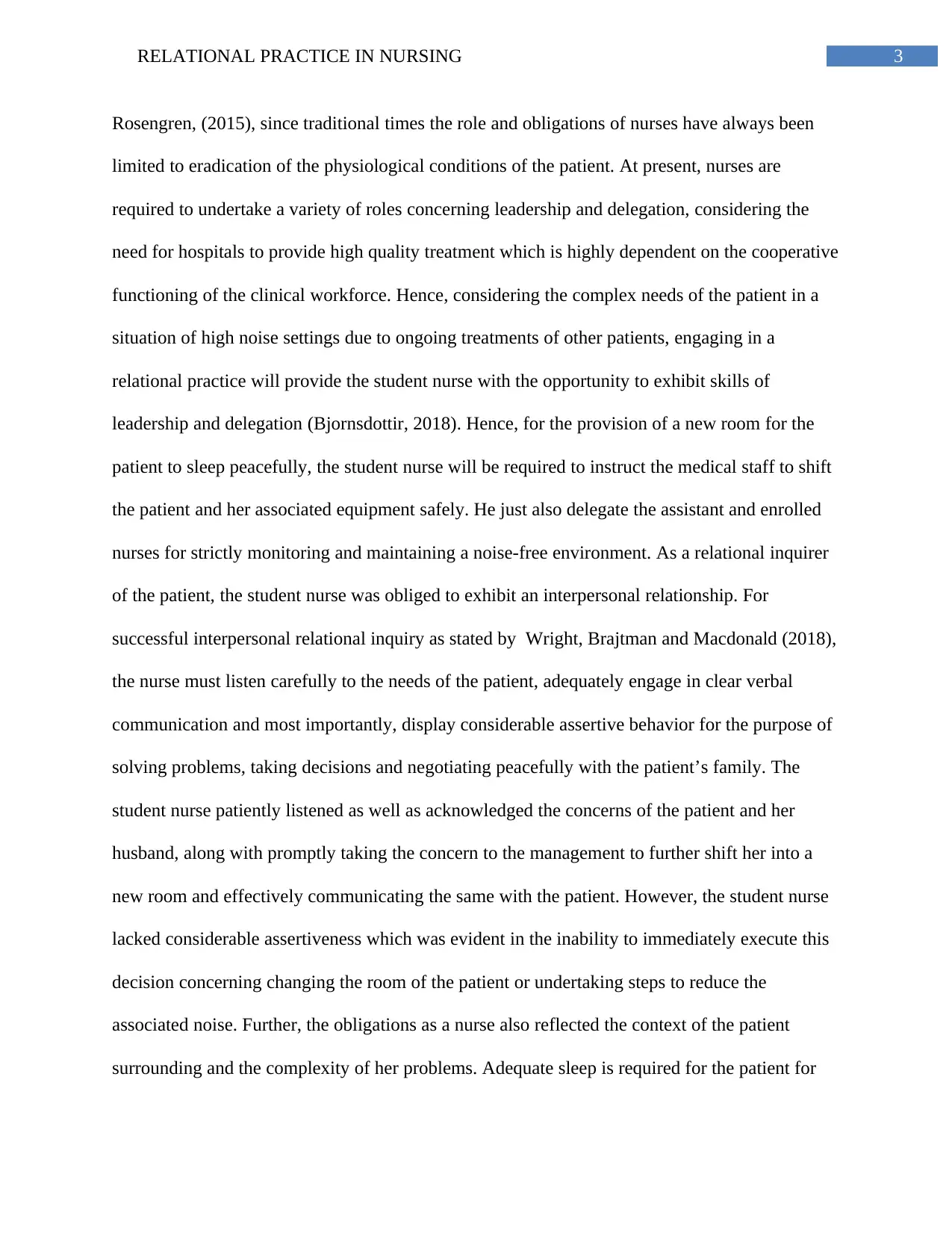
3RELATIONAL PRACTICE IN NURSING
Rosengren, (2015), since traditional times the role and obligations of nurses have always been
limited to eradication of the physiological conditions of the patient. At present, nurses are
required to undertake a variety of roles concerning leadership and delegation, considering the
need for hospitals to provide high quality treatment which is highly dependent on the cooperative
functioning of the clinical workforce. Hence, considering the complex needs of the patient in a
situation of high noise settings due to ongoing treatments of other patients, engaging in a
relational practice will provide the student nurse with the opportunity to exhibit skills of
leadership and delegation (Bjornsdottir, 2018). Hence, for the provision of a new room for the
patient to sleep peacefully, the student nurse will be required to instruct the medical staff to shift
the patient and her associated equipment safely. He just also delegate the assistant and enrolled
nurses for strictly monitoring and maintaining a noise-free environment. As a relational inquirer
of the patient, the student nurse was obliged to exhibit an interpersonal relationship. For
successful interpersonal relational inquiry as stated by Wright, Brajtman and Macdonald (2018),
the nurse must listen carefully to the needs of the patient, adequately engage in clear verbal
communication and most importantly, display considerable assertive behavior for the purpose of
solving problems, taking decisions and negotiating peacefully with the patient’s family. The
student nurse patiently listened as well as acknowledged the concerns of the patient and her
husband, along with promptly taking the concern to the management to further shift her into a
new room and effectively communicating the same with the patient. However, the student nurse
lacked considerable assertiveness which was evident in the inability to immediately execute this
decision concerning changing the room of the patient or undertaking steps to reduce the
associated noise. Further, the obligations as a nurse also reflected the context of the patient
surrounding and the complexity of her problems. Adequate sleep is required for the patient for
Rosengren, (2015), since traditional times the role and obligations of nurses have always been
limited to eradication of the physiological conditions of the patient. At present, nurses are
required to undertake a variety of roles concerning leadership and delegation, considering the
need for hospitals to provide high quality treatment which is highly dependent on the cooperative
functioning of the clinical workforce. Hence, considering the complex needs of the patient in a
situation of high noise settings due to ongoing treatments of other patients, engaging in a
relational practice will provide the student nurse with the opportunity to exhibit skills of
leadership and delegation (Bjornsdottir, 2018). Hence, for the provision of a new room for the
patient to sleep peacefully, the student nurse will be required to instruct the medical staff to shift
the patient and her associated equipment safely. He just also delegate the assistant and enrolled
nurses for strictly monitoring and maintaining a noise-free environment. As a relational inquirer
of the patient, the student nurse was obliged to exhibit an interpersonal relationship. For
successful interpersonal relational inquiry as stated by Wright, Brajtman and Macdonald (2018),
the nurse must listen carefully to the needs of the patient, adequately engage in clear verbal
communication and most importantly, display considerable assertive behavior for the purpose of
solving problems, taking decisions and negotiating peacefully with the patient’s family. The
student nurse patiently listened as well as acknowledged the concerns of the patient and her
husband, along with promptly taking the concern to the management to further shift her into a
new room and effectively communicating the same with the patient. However, the student nurse
lacked considerable assertiveness which was evident in the inability to immediately execute this
decision concerning changing the room of the patient or undertaking steps to reduce the
associated noise. Further, the obligations as a nurse also reflected the context of the patient
surrounding and the complexity of her problems. Adequate sleep is required for the patient for
Paraphrase This Document
Need a fresh take? Get an instant paraphrase of this document with our AI Paraphraser
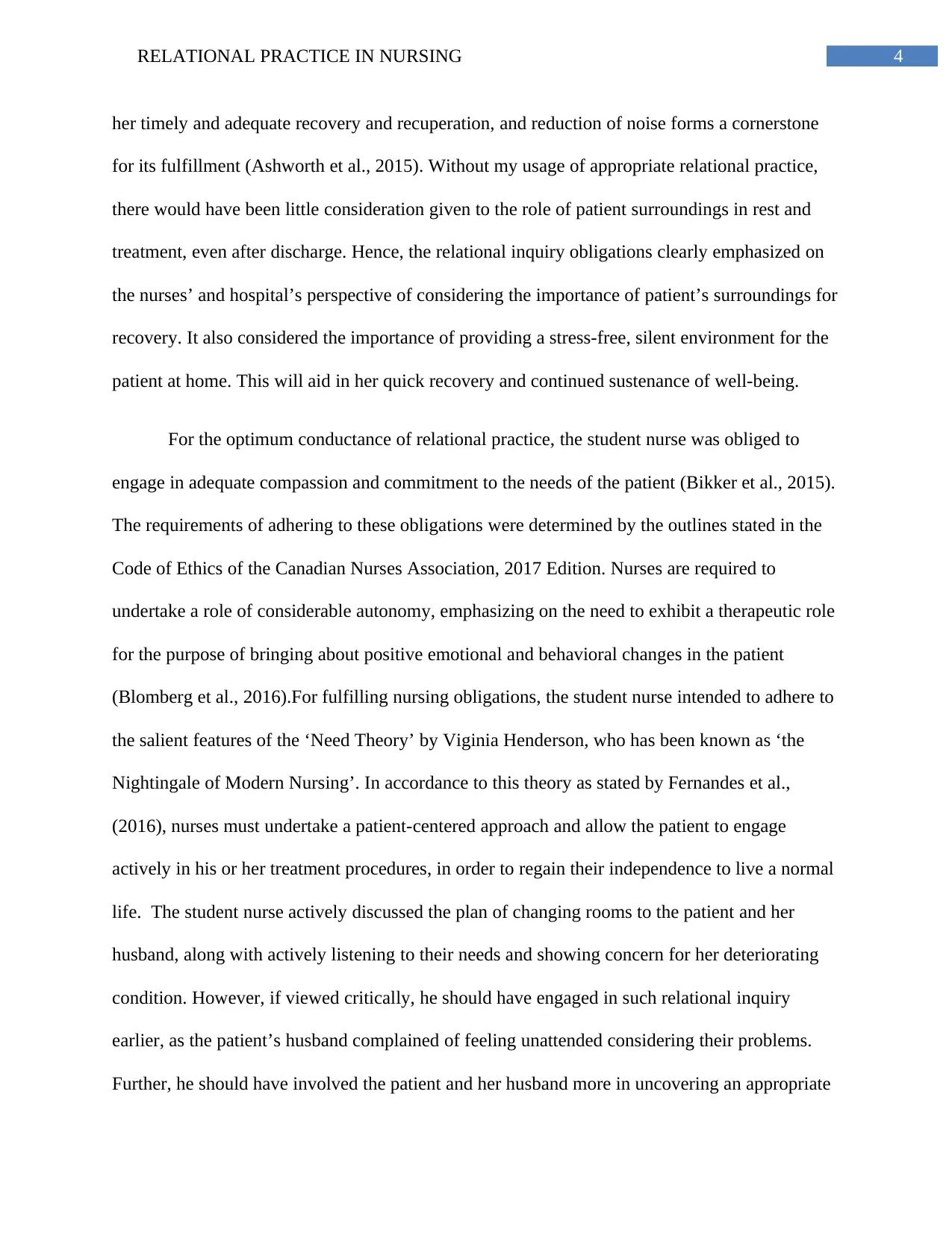
4RELATIONAL PRACTICE IN NURSING
her timely and adequate recovery and recuperation, and reduction of noise forms a cornerstone
for its fulfillment (Ashworth et al., 2015). Without my usage of appropriate relational practice,
there would have been little consideration given to the role of patient surroundings in rest and
treatment, even after discharge. Hence, the relational inquiry obligations clearly emphasized on
the nurses’ and hospital’s perspective of considering the importance of patient’s surroundings for
recovery. It also considered the importance of providing a stress-free, silent environment for the
patient at home. This will aid in her quick recovery and continued sustenance of well-being.
For the optimum conductance of relational practice, the student nurse was obliged to
engage in adequate compassion and commitment to the needs of the patient (Bikker et al., 2015).
The requirements of adhering to these obligations were determined by the outlines stated in the
Code of Ethics of the Canadian Nurses Association, 2017 Edition. Nurses are required to
undertake a role of considerable autonomy, emphasizing on the need to exhibit a therapeutic role
for the purpose of bringing about positive emotional and behavioral changes in the patient
(Blomberg et al., 2016).For fulfilling nursing obligations, the student nurse intended to adhere to
the salient features of the ‘Need Theory’ by Viginia Henderson, who has been known as ‘the
Nightingale of Modern Nursing’. In accordance to this theory as stated by Fernandes et al.,
(2016), nurses must undertake a patient-centered approach and allow the patient to engage
actively in his or her treatment procedures, in order to regain their independence to live a normal
life. The student nurse actively discussed the plan of changing rooms to the patient and her
husband, along with actively listening to their needs and showing concern for her deteriorating
condition. However, if viewed critically, he should have engaged in such relational inquiry
earlier, as the patient’s husband complained of feeling unattended considering their problems.
Further, he should have involved the patient and her husband more in uncovering an appropriate
her timely and adequate recovery and recuperation, and reduction of noise forms a cornerstone
for its fulfillment (Ashworth et al., 2015). Without my usage of appropriate relational practice,
there would have been little consideration given to the role of patient surroundings in rest and
treatment, even after discharge. Hence, the relational inquiry obligations clearly emphasized on
the nurses’ and hospital’s perspective of considering the importance of patient’s surroundings for
recovery. It also considered the importance of providing a stress-free, silent environment for the
patient at home. This will aid in her quick recovery and continued sustenance of well-being.
For the optimum conductance of relational practice, the student nurse was obliged to
engage in adequate compassion and commitment to the needs of the patient (Bikker et al., 2015).
The requirements of adhering to these obligations were determined by the outlines stated in the
Code of Ethics of the Canadian Nurses Association, 2017 Edition. Nurses are required to
undertake a role of considerable autonomy, emphasizing on the need to exhibit a therapeutic role
for the purpose of bringing about positive emotional and behavioral changes in the patient
(Blomberg et al., 2016).For fulfilling nursing obligations, the student nurse intended to adhere to
the salient features of the ‘Need Theory’ by Viginia Henderson, who has been known as ‘the
Nightingale of Modern Nursing’. In accordance to this theory as stated by Fernandes et al.,
(2016), nurses must undertake a patient-centered approach and allow the patient to engage
actively in his or her treatment procedures, in order to regain their independence to live a normal
life. The student nurse actively discussed the plan of changing rooms to the patient and her
husband, along with actively listening to their needs and showing concern for her deteriorating
condition. However, if viewed critically, he should have engaged in such relational inquiry
earlier, as the patient’s husband complained of feeling unattended considering their problems.
Further, he should have involved the patient and her husband more in uncovering an appropriate
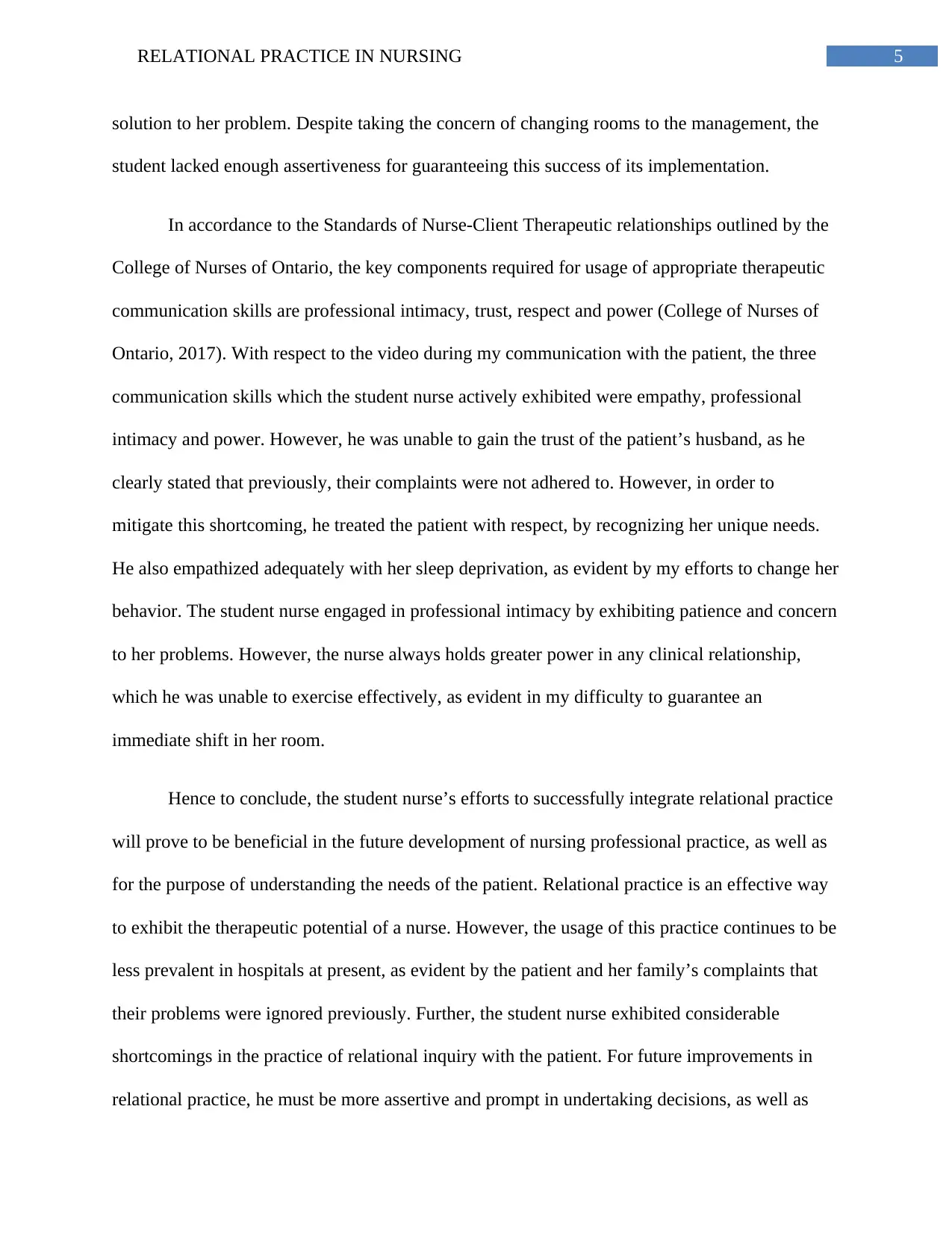
5RELATIONAL PRACTICE IN NURSING
solution to her problem. Despite taking the concern of changing rooms to the management, the
student lacked enough assertiveness for guaranteeing this success of its implementation.
In accordance to the Standards of Nurse-Client Therapeutic relationships outlined by the
College of Nurses of Ontario, the key components required for usage of appropriate therapeutic
communication skills are professional intimacy, trust, respect and power (College of Nurses of
Ontario, 2017). With respect to the video during my communication with the patient, the three
communication skills which the student nurse actively exhibited were empathy, professional
intimacy and power. However, he was unable to gain the trust of the patient’s husband, as he
clearly stated that previously, their complaints were not adhered to. However, in order to
mitigate this shortcoming, he treated the patient with respect, by recognizing her unique needs.
He also empathized adequately with her sleep deprivation, as evident by my efforts to change her
behavior. The student nurse engaged in professional intimacy by exhibiting patience and concern
to her problems. However, the nurse always holds greater power in any clinical relationship,
which he was unable to exercise effectively, as evident in my difficulty to guarantee an
immediate shift in her room.
Hence to conclude, the student nurse’s efforts to successfully integrate relational practice
will prove to be beneficial in the future development of nursing professional practice, as well as
for the purpose of understanding the needs of the patient. Relational practice is an effective way
to exhibit the therapeutic potential of a nurse. However, the usage of this practice continues to be
less prevalent in hospitals at present, as evident by the patient and her family’s complaints that
their problems were ignored previously. Further, the student nurse exhibited considerable
shortcomings in the practice of relational inquiry with the patient. For future improvements in
relational practice, he must be more assertive and prompt in undertaking decisions, as well as
solution to her problem. Despite taking the concern of changing rooms to the management, the
student lacked enough assertiveness for guaranteeing this success of its implementation.
In accordance to the Standards of Nurse-Client Therapeutic relationships outlined by the
College of Nurses of Ontario, the key components required for usage of appropriate therapeutic
communication skills are professional intimacy, trust, respect and power (College of Nurses of
Ontario, 2017). With respect to the video during my communication with the patient, the three
communication skills which the student nurse actively exhibited were empathy, professional
intimacy and power. However, he was unable to gain the trust of the patient’s husband, as he
clearly stated that previously, their complaints were not adhered to. However, in order to
mitigate this shortcoming, he treated the patient with respect, by recognizing her unique needs.
He also empathized adequately with her sleep deprivation, as evident by my efforts to change her
behavior. The student nurse engaged in professional intimacy by exhibiting patience and concern
to her problems. However, the nurse always holds greater power in any clinical relationship,
which he was unable to exercise effectively, as evident in my difficulty to guarantee an
immediate shift in her room.
Hence to conclude, the student nurse’s efforts to successfully integrate relational practice
will prove to be beneficial in the future development of nursing professional practice, as well as
for the purpose of understanding the needs of the patient. Relational practice is an effective way
to exhibit the therapeutic potential of a nurse. However, the usage of this practice continues to be
less prevalent in hospitals at present, as evident by the patient and her family’s complaints that
their problems were ignored previously. Further, the student nurse exhibited considerable
shortcomings in the practice of relational inquiry with the patient. For future improvements in
relational practice, he must be more assertive and prompt in undertaking decisions, as well as
⊘ This is a preview!⊘
Do you want full access?
Subscribe today to unlock all pages.

Trusted by 1+ million students worldwide
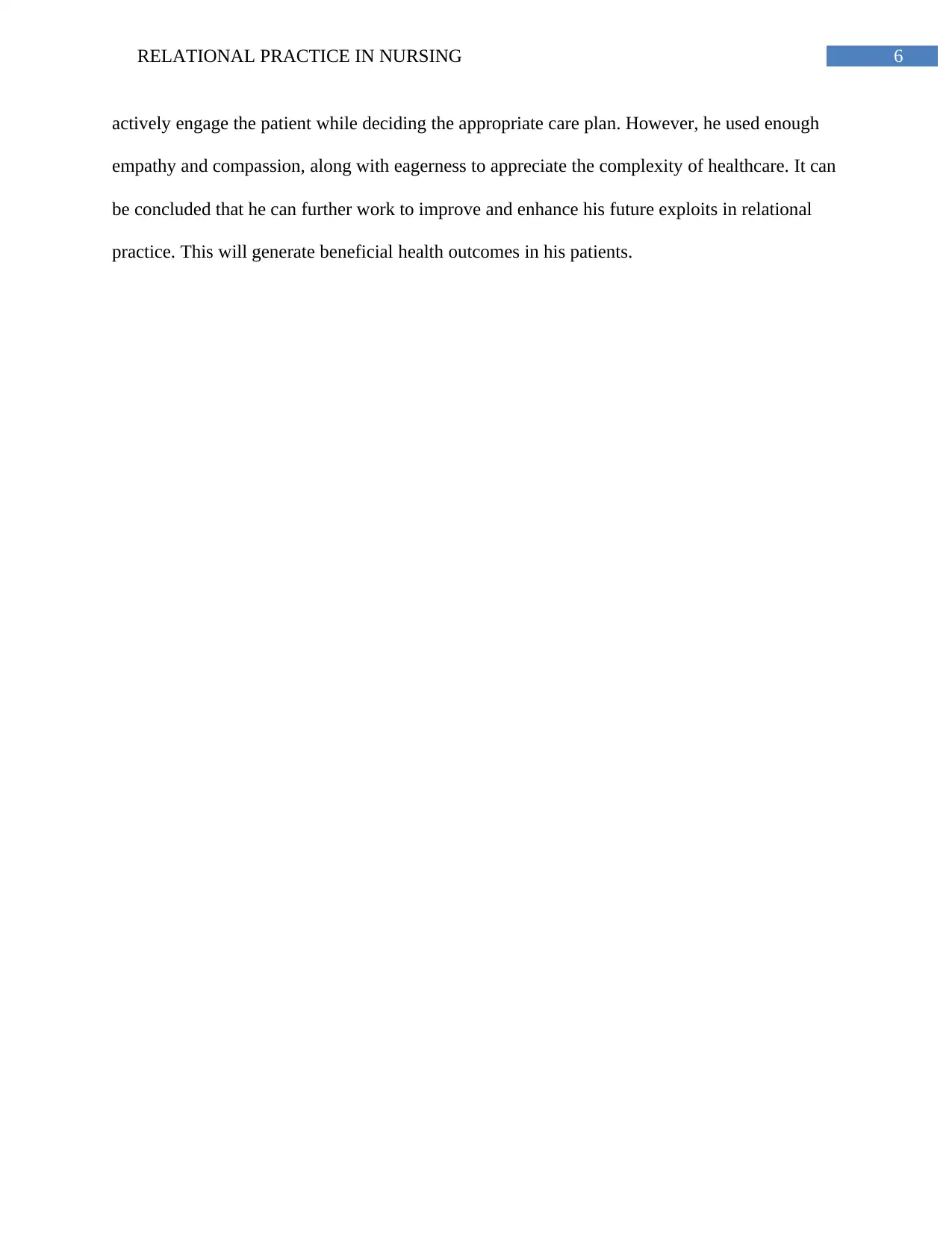
6RELATIONAL PRACTICE IN NURSING
actively engage the patient while deciding the appropriate care plan. However, he used enough
empathy and compassion, along with eagerness to appreciate the complexity of healthcare. It can
be concluded that he can further work to improve and enhance his future exploits in relational
practice. This will generate beneficial health outcomes in his patients.
actively engage the patient while deciding the appropriate care plan. However, he used enough
empathy and compassion, along with eagerness to appreciate the complexity of healthcare. It can
be concluded that he can further work to improve and enhance his future exploits in relational
practice. This will generate beneficial health outcomes in his patients.
Paraphrase This Document
Need a fresh take? Get an instant paraphrase of this document with our AI Paraphraser
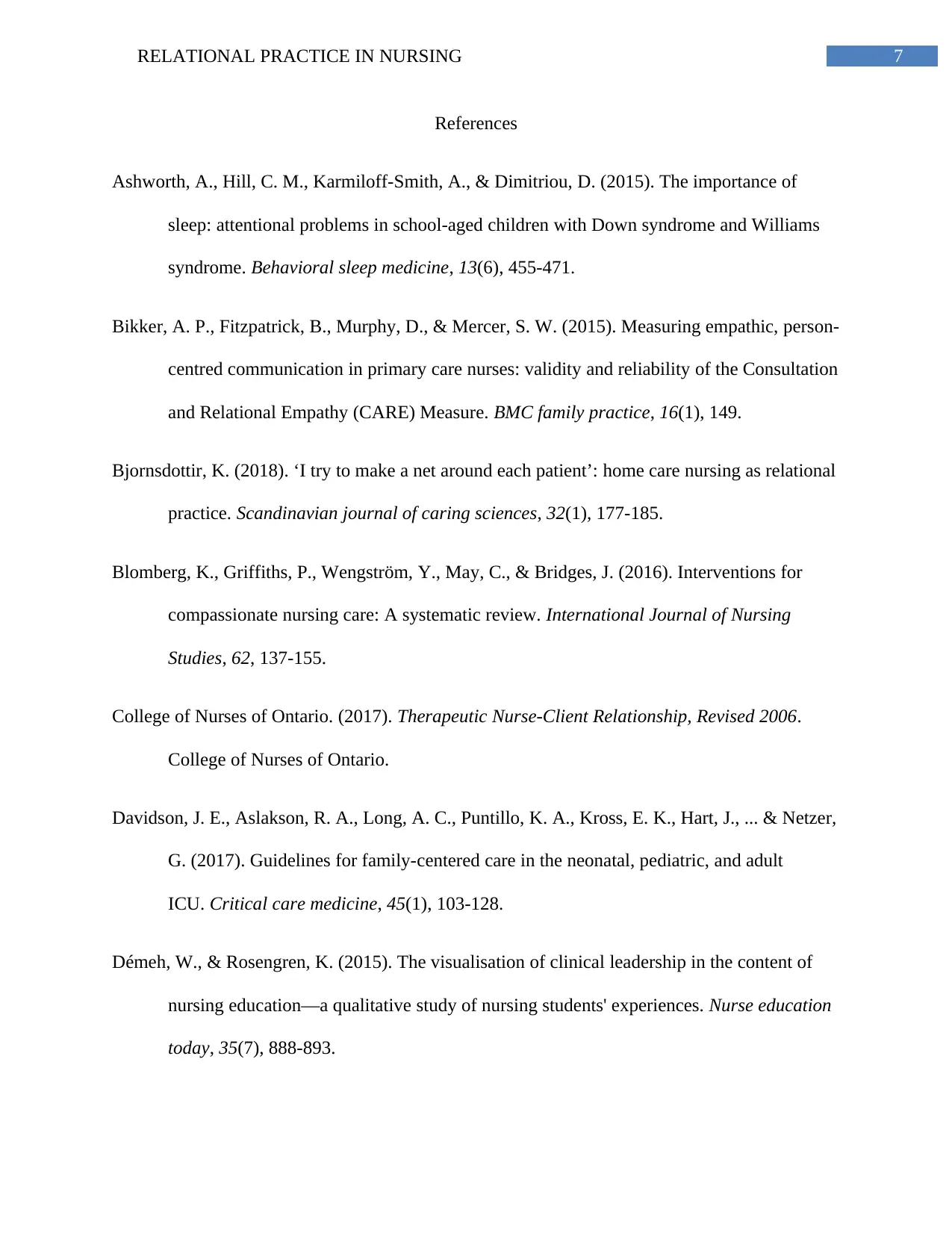
7RELATIONAL PRACTICE IN NURSING
References
Ashworth, A., Hill, C. M., Karmiloff-Smith, A., & Dimitriou, D. (2015). The importance of
sleep: attentional problems in school-aged children with Down syndrome and Williams
syndrome. Behavioral sleep medicine, 13(6), 455-471.
Bikker, A. P., Fitzpatrick, B., Murphy, D., & Mercer, S. W. (2015). Measuring empathic, person-
centred communication in primary care nurses: validity and reliability of the Consultation
and Relational Empathy (CARE) Measure. BMC family practice, 16(1), 149.
Bjornsdottir, K. (2018). ‘I try to make a net around each patient’: home care nursing as relational
practice. Scandinavian journal of caring sciences, 32(1), 177-185.
Blomberg, K., Griffiths, P., Wengström, Y., May, C., & Bridges, J. (2016). Interventions for
compassionate nursing care: A systematic review. International Journal of Nursing
Studies, 62, 137-155.
College of Nurses of Ontario. (2017). Therapeutic Nurse-Client Relationship, Revised 2006.
College of Nurses of Ontario.
Davidson, J. E., Aslakson, R. A., Long, A. C., Puntillo, K. A., Kross, E. K., Hart, J., ... & Netzer,
G. (2017). Guidelines for family-centered care in the neonatal, pediatric, and adult
ICU. Critical care medicine, 45(1), 103-128.
Démeh, W., & Rosengren, K. (2015). The visualisation of clinical leadership in the content of
nursing education—a qualitative study of nursing students' experiences. Nurse education
today, 35(7), 888-893.
References
Ashworth, A., Hill, C. M., Karmiloff-Smith, A., & Dimitriou, D. (2015). The importance of
sleep: attentional problems in school-aged children with Down syndrome and Williams
syndrome. Behavioral sleep medicine, 13(6), 455-471.
Bikker, A. P., Fitzpatrick, B., Murphy, D., & Mercer, S. W. (2015). Measuring empathic, person-
centred communication in primary care nurses: validity and reliability of the Consultation
and Relational Empathy (CARE) Measure. BMC family practice, 16(1), 149.
Bjornsdottir, K. (2018). ‘I try to make a net around each patient’: home care nursing as relational
practice. Scandinavian journal of caring sciences, 32(1), 177-185.
Blomberg, K., Griffiths, P., Wengström, Y., May, C., & Bridges, J. (2016). Interventions for
compassionate nursing care: A systematic review. International Journal of Nursing
Studies, 62, 137-155.
College of Nurses of Ontario. (2017). Therapeutic Nurse-Client Relationship, Revised 2006.
College of Nurses of Ontario.
Davidson, J. E., Aslakson, R. A., Long, A. C., Puntillo, K. A., Kross, E. K., Hart, J., ... & Netzer,
G. (2017). Guidelines for family-centered care in the neonatal, pediatric, and adult
ICU. Critical care medicine, 45(1), 103-128.
Démeh, W., & Rosengren, K. (2015). The visualisation of clinical leadership in the content of
nursing education—a qualitative study of nursing students' experiences. Nurse education
today, 35(7), 888-893.
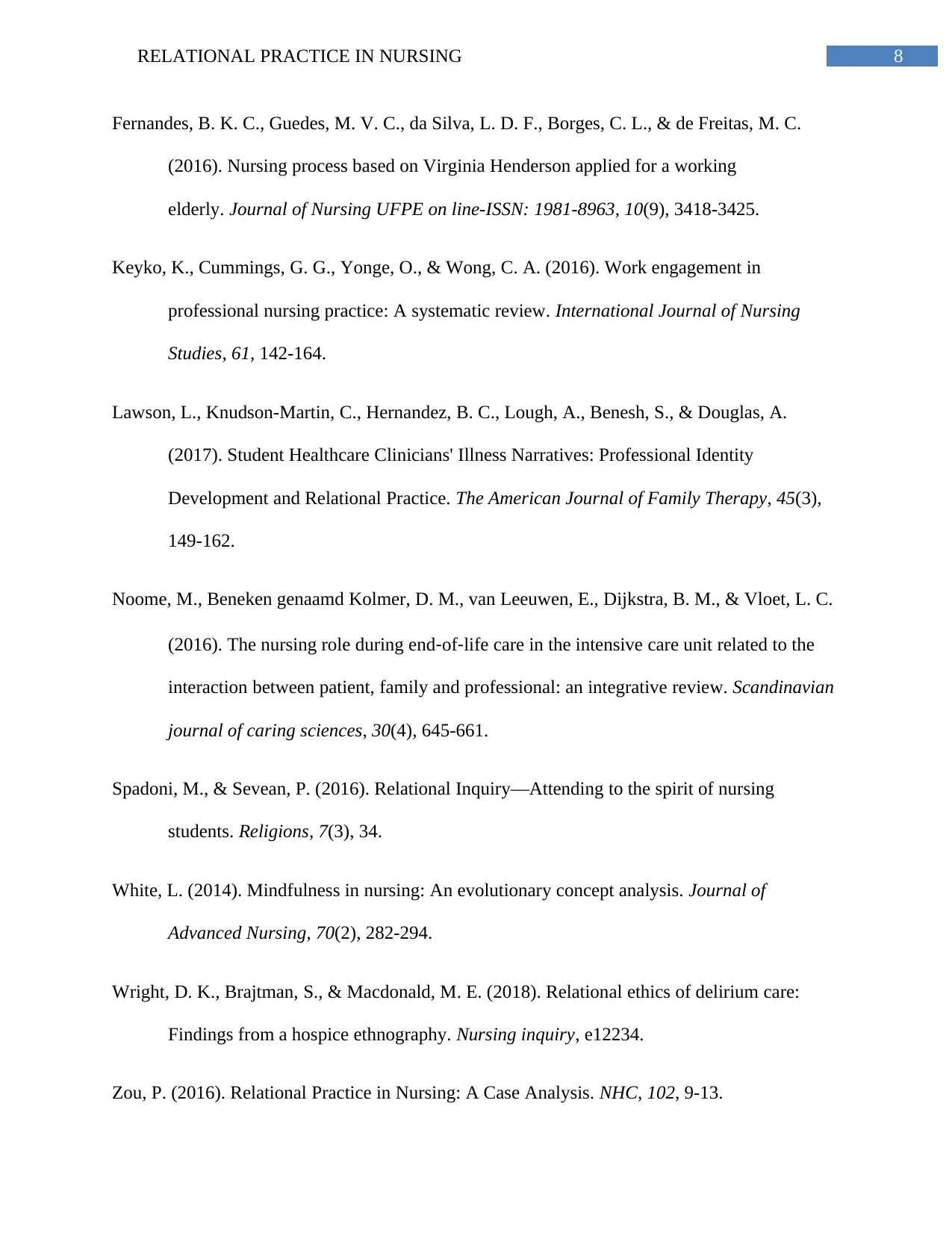
8RELATIONAL PRACTICE IN NURSING
Fernandes, B. K. C., Guedes, M. V. C., da Silva, L. D. F., Borges, C. L., & de Freitas, M. C.
(2016). Nursing process based on Virginia Henderson applied for a working
elderly. Journal of Nursing UFPE on line-ISSN: 1981-8963, 10(9), 3418-3425.
Keyko, K., Cummings, G. G., Yonge, O., & Wong, C. A. (2016). Work engagement in
professional nursing practice: A systematic review. International Journal of Nursing
Studies, 61, 142-164.
Lawson, L., Knudson-Martin, C., Hernandez, B. C., Lough, A., Benesh, S., & Douglas, A.
(2017). Student Healthcare Clinicians' Illness Narratives: Professional Identity
Development and Relational Practice. The American Journal of Family Therapy, 45(3),
149-162.
Noome, M., Beneken genaamd Kolmer, D. M., van Leeuwen, E., Dijkstra, B. M., & Vloet, L. C.
(2016). The nursing role during end‐of‐life care in the intensive care unit related to the
interaction between patient, family and professional: an integrative review. Scandinavian
journal of caring sciences, 30(4), 645-661.
Spadoni, M., & Sevean, P. (2016). Relational Inquiry—Attending to the spirit of nursing
students. Religions, 7(3), 34.
White, L. (2014). Mindfulness in nursing: An evolutionary concept analysis. Journal of
Advanced Nursing, 70(2), 282-294.
Wright, D. K., Brajtman, S., & Macdonald, M. E. (2018). Relational ethics of delirium care:
Findings from a hospice ethnography. Nursing inquiry, e12234.
Zou, P. (2016). Relational Practice in Nursing: A Case Analysis. NHC, 102, 9-13.
Fernandes, B. K. C., Guedes, M. V. C., da Silva, L. D. F., Borges, C. L., & de Freitas, M. C.
(2016). Nursing process based on Virginia Henderson applied for a working
elderly. Journal of Nursing UFPE on line-ISSN: 1981-8963, 10(9), 3418-3425.
Keyko, K., Cummings, G. G., Yonge, O., & Wong, C. A. (2016). Work engagement in
professional nursing practice: A systematic review. International Journal of Nursing
Studies, 61, 142-164.
Lawson, L., Knudson-Martin, C., Hernandez, B. C., Lough, A., Benesh, S., & Douglas, A.
(2017). Student Healthcare Clinicians' Illness Narratives: Professional Identity
Development and Relational Practice. The American Journal of Family Therapy, 45(3),
149-162.
Noome, M., Beneken genaamd Kolmer, D. M., van Leeuwen, E., Dijkstra, B. M., & Vloet, L. C.
(2016). The nursing role during end‐of‐life care in the intensive care unit related to the
interaction between patient, family and professional: an integrative review. Scandinavian
journal of caring sciences, 30(4), 645-661.
Spadoni, M., & Sevean, P. (2016). Relational Inquiry—Attending to the spirit of nursing
students. Religions, 7(3), 34.
White, L. (2014). Mindfulness in nursing: An evolutionary concept analysis. Journal of
Advanced Nursing, 70(2), 282-294.
Wright, D. K., Brajtman, S., & Macdonald, M. E. (2018). Relational ethics of delirium care:
Findings from a hospice ethnography. Nursing inquiry, e12234.
Zou, P. (2016). Relational Practice in Nursing: A Case Analysis. NHC, 102, 9-13.
⊘ This is a preview!⊘
Do you want full access?
Subscribe today to unlock all pages.

Trusted by 1+ million students worldwide
1 out of 9
Related Documents
Your All-in-One AI-Powered Toolkit for Academic Success.
+13062052269
info@desklib.com
Available 24*7 on WhatsApp / Email
![[object Object]](/_next/static/media/star-bottom.7253800d.svg)
Unlock your academic potential
Copyright © 2020–2026 A2Z Services. All Rights Reserved. Developed and managed by ZUCOL.





